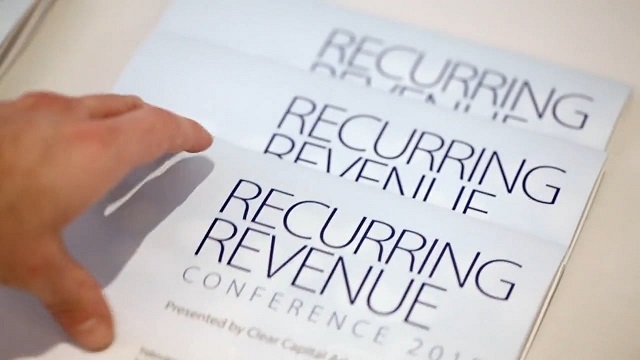
It was fun at first, unpredictable and plenty exciting. But now? You’re sick of the uncertainty and all the stress.
One week you’re so busy you hardly have time to shower or eat. And the next you’re staring out the window with no idea where all the paying work went.
The feast or famine cycle catches a lot of new entrepreneurs by surprise. Some of them never quite figure out how to handle it… and worry themselves sick instead.
Good news:
You can act now to add some much-needed stability to your income and workload. Keep reading to find out how!
Too Much Work, Then Not Enough – A Vicious Cycle
The lack of a steady paycheck is one of the most stressful parts of life as a freelancer or entrepreneur.
Your old 9 to 5 might have not been exciting or creatively fulfilling, but at least you knew when the money was coming in – and how much.
This uncertainty can be a tough pill for new freelancers and entrepreneurs to swallow. Your mortgage, bills, and other expenses are predictable. But now your income isn’t.
A little uncertainty is fine when you’re busy and bringing in plenty of work, but it can keep you up at night worrying once things slow down.
It’s so easy to spend freely when things are good, convince yourself that things will always be like this, and end up scrambling to pay your bills during the inevitable famines.
People also struggle with not knowing what to do now to keep these fluctuations from being so bad in the future. They unwittingly engage in the same work and spending habits that ensure these cycles will continue, even though they don’t want them to.
What Happens When Serving Customers and Clients Takes Over Your Business
If you’ve run own business for long, you know what it’s like to face a packed schedule. That’s par for the course!
In the beginning there were all kinds of different tasks to think about. Things like setting up your business bank account, building a website, and developing a portfolio. You had to market heavily to bring in those first few customers or clients.
But for many of us, all of this changes once we have a batch of paying customers. Each day, more and more time is spent serving their needs.
It’s hard to turn down money, after all. Before you know it, you’re sitting at the computer 14 hours a day just doing customer/client work.
Other tasks, like admin work and marketing, fall through the cracks during these “feast” times. You already have the customers. So you’ll just catch up with that stuff later… right?
Not exactly.
If you put those things off until the famine times when work dries up, you’ll feel like you’re starting over from scratch. Any momentum you’ve built up from past efforts will be gone, so you’ll have to bust your tail to find some new customers…
And before you know it, the whole cycle is repeating itself!
Add Stability to Your Income and Workload
You might not ever make your income and workload as predictable as it was in a 9 to 5, but there are plenty of things you can do now to even out those painful swings.
Most people aren’t doing these things. Maybe they say they’ll get around to them when they have time later, except “later” never comes.
The sooner you start applying these things, the sooner you’ll tame your feast or famine problem.
1. Always Make Time for Marketing (Especially When You’re Busy)
Photo Credit: WildOne
It’s easy to market when you’re just starting your business. After all, that’s the best way to find paying customers!
But it becomes a lot tougher to keep marketing when you have plenty of paying work. When you’re spending eight, 10, or 12 hours a day serving customers, marketing is one of the first things that falls through the cracks. You find yourself putting it off for days, weeks, and even months.
This is a big mistake. It sounds counter-intuitive, but marketing when you’re busy is actually one of the most important times to do it.
So much of marketing relies on steady momentum. That blog post you write today might not earn you a paying client until the right person sees it six months from now. Producing content (blog posts, social media, emails, etc.) consistently will gradually increase your awareness in people’s minds.
Resist the urge to do “binge marketing.” That’s what a lot of people do when they find themselves in a famine. They do whatever they can to find work, but in a month they quit marketing again.
Build your platform steadily. Doing so while you have a lot of paying customers might seem demanding, but it will keep you afloat when the work slows down.
I used to set aside an hour or two every workday to do marketing. That works well for a lot of people, and it might work for you too.
I struggled with that approach, though, because I always ended up doing client work first and finding excuses not to market at the end of the day when I was exhausted.
My new strategy?
I set aside Fridays for just marketing. This gives me a nice ratio (80 % time on client work to 20% on marketing), and allows long periods of uninterrupted time to crank out a lot of marketing content.
You can even batch your content, writing multiple blog posts, emails, or social media posts and then use automated tools (like autoresponders) to drip out the content gradually.
2. Spend a Few Minutes Planning Your Workdays for Better Time Management
Photo Credit: The Italian Voice
You can drive yourself crazy worrying about how you’ll get paid a few months from now…
Or you can take action and do something about it!
One thing that’s helped me a lot this year has been to simply take a few minutes at the end of each workday to plan what I want to do tomorrow.
I force myself to limit my schedule to my three to five most important tasks, and I start with the most important one the next morning. I don’t stop until it’s finished, and then I move on.
On Sunday evenings, I’ll spend about 20 or 30 minutes planning out the major tasks I want to accomplish the next week. I can always adapt this schedule (I keep it pretty loose) once I start the work and get a better idea exactly how long each thing will take.
One of the most common pitfalls is getting caught up in a loop of reactive tasks.
You wake up in the morning without a clear idea of what you want to do first, so you end up checking your email. It seems harmless… until you find something from a client. You spend your best hours reacting to others’ demands and don’t leave enough time for your most important tasks.
Planning will help whether you’re in a feast or famine. You’ll stay focused on the most important work when your schedule is full. And when it isn’t, you’ll at least have a road map of steps to follow to improve the situation.
All we can control is how hard we work and how well we spend our time. Do those things well – and don’t stress so much about what might happen – and a lot of your feast or famine problems will take care of themselves.
3. Save Money During the Good Times
Photo Credit: 401(K) 2012
Not having anything to do during a famine is frustrating. But worrying about whether you’ll have enough money to make it until next month is an absolute nightmare.
This is exactly what happens to a lot of people who run their own business. It doesn’t have to happen to you, though.
When you’re feasting and the money is good, it’s incredibly tempting to spend some of that cash on a vacation, new wardrobe, and anything else that catches your eye.
I’m not saying you shouldn’t treat yourself. But it’s a better idea to hold off until you’re confident you have your next few months’ expenses squared away first.
Having a savings account with at least six months of living expenses is power. It’s peace of mind that will keep you from worrying so much during the tough times.
How much should you save?
That depends a lot on your unique financial situation, and whether you’re expecting any big expenses (kids, college tuition, etc.) soon.
Do yourself a favor and figure out a baseline amount you need to cover your expenses every month. Save up at least a few months of that amount, and do whatever you can to add more during the good times.
You’ll thank yourself later!
4. Learn to Negotiate Better Rates and Deadlines
Photo Credit: Aidan Jones
A lot of feast or famine problems arise from not being able to say “no.”
You’re so excited to get paying work you don’t even consider turning anyone down – not even if they pay less than you’d like or have extremely tight deadlines.
What happens?
You end up stressed out and miserable because your schedule is packed with low-paying but urgent projects.
Being more selective and standing up for yourself will help.
Watch out for overloading yourself with multiple deadlines that fall around the same time!
If there’s a project you’d like to take on but you’re booked for the next few weeks, why not ask the prospect if you could get started then? The worst thing they can so is say no. Most people will be willing to work with you.
Here’s a good question to ask yourself about rates:
How much would you have to charge to make a living working only three days a week?
This is a good guideline amount because, even if you’re working five days a week (or more), you won’t be spending all that time on billable tasks. It also takes into account the inevitable famines when you’re looking for work. Charging a healthy amount will help you save some cash when the times are good… and not stress too much when they aren’t.
5. Aim for Retainers and Other Long-Term Arrangements
Photo Credit: Vimeo
One of the nicest things about a 9 to 5 is knowing exactly how much money will come in each month.
You can’t replicate that perfectly in the world of entrepreneurship, but long-term relationships and recurring revenue will help.
An endless series of one-off projects (or one-time transactions with customers) can be frustrating because, while you make good money now, you never see them again. You constantly have to replace people to cover next month’s bills.
It’s always a good idea to find ways to offer ongoing services. If you’re a writer, you could offer a monthly blog package that includes a certain number of posts. Web developers or designers could offer maintenance or hosting packages and support. Consultants could offer regular reporting and analysis.
The possibilities are endless. If you’ve been working with a few people for a while, consider approaching them about a potential retainer agreement. It only takes one or two of these to eliminate a lot of pesky feast or famine issues.
Long-term arrangements don’t just help you predict how much money you’ll make. They also help you plan your workflow, as you’ll know beforehand about how long it will take to satisfy your retainer agreements. That makes you less likely to over-book on other stuff.
Give Yourself Less Stress and Some Peace of Mind
The feast or famine cycle drives a lot of entrepreneurs nuts, but you can rise above it.
Although your business won’t ever be as predictable as a 9 to 5, you can act to stabilize your income and workload from month to month.
So give the tips above a try. The peace of mind, less stress, and a manageable schedule are more than worth it.
Have you struggled with the feast or famine problem? How do you handle it when things get tough? Leave a comment below and let me know!






